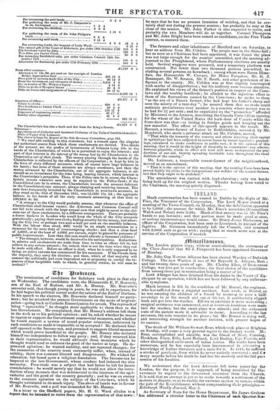Zbe Vrobintes.
The nomination of candidates for Salisbury took place in that city on Wednesday. The candidates were, the Honourable E. P. Bouverie, son of the Earl of Radnor, and Mr. A. Hussey. Mr. Bouverie's seconder said, that though young in years, be was old in experience, for he had begun his political career under the tuition of the Earl of Durham. In his speech to the electors, Mr. Bouverie .declared himself no party- man ; but he attacked the present Government on the score of tergiver- sation —going back to Catholic Emancipation for proofs. The reproach of being " squeezable" he thought more applicable to them than to the late Government. He complained, that Mr. Hussey's address left them in the dark as to his political opinions ; and he asked whether he meant to oppose or support the Government commercial measures, and whether he would support a system of sound popular education, unfettered by such conditions as made it impossible to be accepted ? He declared him- self opposed to the Income-tax, and promised to support liberal measures which would prove beneficial to the people. Mr. Hussey also declared himself too independent to follow any party; and, if they returned him as their representative, he would advocate those measures which he thought would tend to enhance the good of the nation at large. He de- precated agitation : he wanted stability, and not repeated changes ; for the commerce of the country must necessarily suffer, when, instead of solidity, there was constant discord and disagreement. He wished for education, but based upon a religious foundation. The Income-tax he imputed to the late Government, whose conduct had induced the dire necessity. Free-trade was a subject that had better be left for future consideration : he would merely say that be would not allow the intro- duction of any measure that was detrimental to the interests of the agri- culturist and the good of the country generally ; and he was an enemy to the constant agitation on the subject of the Corn-laws, which be thought calculated to do much injury. The show of hands was in favour of Mr. Bouverie, and a poll was demanded for Mr. Hussey.
In a letter to the Sheffield papers, Mr. H. G. Ward alludes to a report that he intended to retire from the representation of that town :
he says that he has no present intention of retiring, and that he cer- tainly shall not during the present session ; but probably he may at the close of the session. Mr. John Parker is also expected to retire, and probably the two Members will do so together. Colonel Thompson and Mr. John Bright have been named as candidates, on the Free Trade interest, to succeed them.
The farmers and other inhabitants of Hertford met on Saturday, to hear an address from Mr. Cobden. The people met in the Shire-hall ; but as soon as a Chairman had been appointed, it was found the place was not large enough for the number assembled, and the meeting ad- journed to the Ploughmead, where Parliamentary elections are usually held. Several waggons were procured, and a temporary platform WU constructed. Not fewer than two thousand persons assembled, in- cluding several persons on horseback ; among whom were Baron Dims- dale, the Honourable W. Cowper, Sir Minto Farquhar, Mr. G. J. Bosauquet, Mr. W. Straton, Mr. F. Booth, and other gentlemen of in- fluence in the county. Mr. Cobden was at first slightly interrupted with marks of disapprobation ; but his auditory soon became attentive. He explained his views of the farmer's position in respect of the Corn- laws and the wealthy landlords; he alluded to the injurious effect to them of the fluctuations caused by the Corn-laws ; he spoke to them "as the son of a Sussex farmer, who had kept his father's sheep and seen the misery of a rent-day "; he assured them that no trade could maintain preeminence over another in a country where money was to be had for 21 per cent ; and he expatiated on the " protection " afforded by Ministers to the farmers, describing the Canada Corn-bill as opening for the wheat of the United States the back-door of Canada while the front-door was shut—as letting in foreign goods and keeping out the raw material. The effect of this speech appears in the result. Mr. Bennett, a tenant-farmer of Luton in Bedfordshire, seconded by Mr. Maydwell, who made a personal attack on Mr. Cobden, moved,
"That while the tenantry of the country and others investing their capital in agriculture had been subjected to severe losses by recent legislative proceed- ings, calculated to shake confidence in public men, it is the opinion of this meeting, that it would be the height of absurdity to countenanca any scheme, however plausible, which in effect will tend still more to depreciate the pro- ductions of our soil, thereby spreading inevitable ruin throughout the rural districts of the country." • Mr. Latimore, a respectable tenant-farmer of the neighbourhood, moved as an amendment,
" That it is the opinion of this meeting, that the existing Corn-laws have proved highly injxrious to the independence and welfare of the tenant-farmer, and that they ought to be abolished."
The amendment was carried with loud cheering ; only ten hands being held up for the original motion. Thanks having been voted to the Chairman, the meeting quietly dispersed.


























 Previous page
Previous page